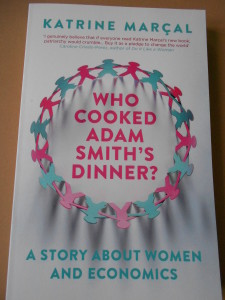A Story about Women and Economics
For two hundred years, economics has argued that the world turns because of self-interest and this logic has spread from the market to how we shop, work and date. But what if our unpaid labour – particularly the work of caring, cleaning and cooking traditionally performed by women- was valued by economics? What would our society look like then? From Adam Smith’s dinner table to the recent financial crisis Katrine Marçal tackles the myth of self-interest and shows us how out economics is failing us, and how much better things could be.
Adam Smith was able to write The Wealth of Nations because he went home to his mother who cooked, cleaned and nurtured him. Would society benefit if these qualities were not only valued but received remuneration on an appropriate scale?
This is an overview of economics written with wit and clarity and challenging the notion of Economic Man. The Equal Pay Act came into force in Britain over 45 years ago and despite this women still earn less than men. So called ‘women’s work’ is still underpaid, undervalued and overlooked. Feminism is about money, says Marçal and proceeds to tell the reader exactly why this is so. Well researched and written; who would have thought that economics could be so interesting? Thanks to Marçal’s erudite writing it is and I enjoyed this book far more than I expected. It made me think about feminism and finances it a totally different way.
The one quote I will definitely take away is that:
‘Men teach us that there are things worth dying for. Women teach us that there are things worth living for.’
Highly recommended.
Who Cooked Adam Smith’s Dinner is published by Portobello Books

